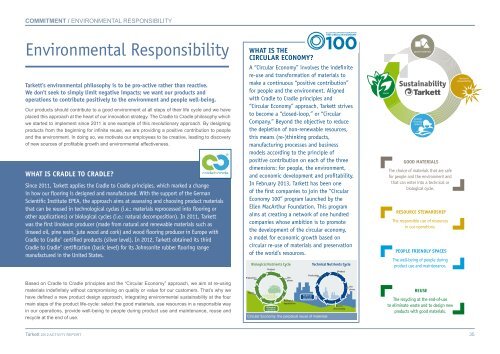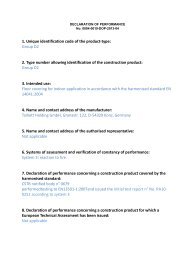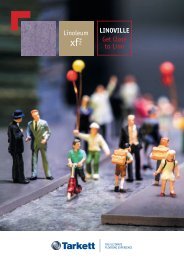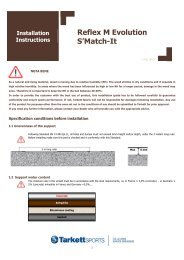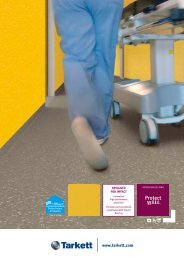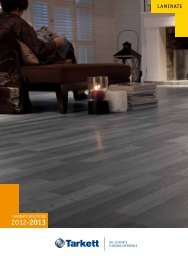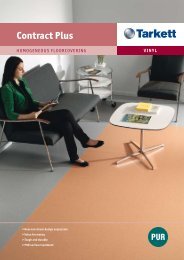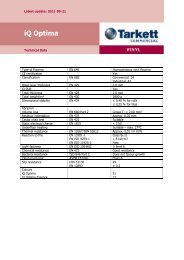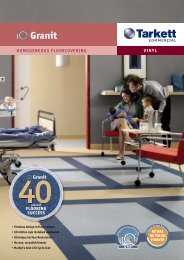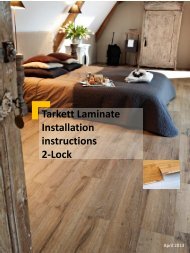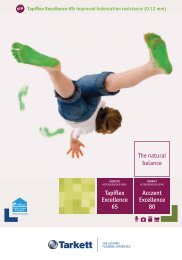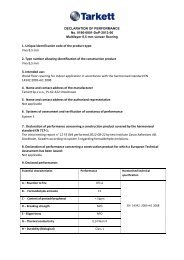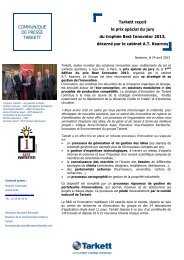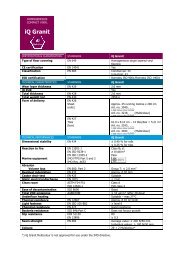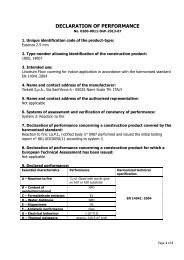Tarkett Activity Report 2012
Tarkett Activity Report 2012
Tarkett Activity Report 2012
Create successful ePaper yourself
Turn your PDF publications into a flip-book with our unique Google optimized e-Paper software.
COMMITMENT / Environmental Responsibility<br />
Environmental Responsibility<br />
<strong>Tarkett</strong>’s environmental philosophy is to be pro-active rather than reactive.<br />
We don’t seek to simply limit negative impacts; we want our products and<br />
operations to contribute positively to the environment and people well-being.<br />
Our products should contribute to a good environment at all steps of their life cycle and we have<br />
placed this approach at the heart of our innovation strategy. The Cradle to Cradle philosophy which<br />
we started to implement since 2011 is one example of this revolutionary approach. By designing<br />
products from the beginning for infinite reuse, we are providing a positive contribution to people<br />
and the environment. In doing so, we motivate our employees to be creative, leading to discovery<br />
of new sources of profitable growth and environmental effectiveness.<br />
What is Cradle to Cradle?<br />
Since 2011, <strong>Tarkett</strong> applies the Cradle to Cradle principles, which marked a change<br />
in how our flooring is designed and manufactured. With the support of the German<br />
Scientific Institute EPEA, the approach aims at assessing and choosing product materials<br />
that can be reused in technological cycles (i.e.: materials reprocessed into flooring or<br />
other applications) or biological cycles (i.e.: natural decomposition). In 2011, <strong>Tarkett</strong><br />
was the first linoleum producer (made from natural and renewable materials such as<br />
linseed oil, pine resin, jute wood and cork) and wood flooring producer in Europe with<br />
Cradle to Cradle ® certified products (silver level). In <strong>2012</strong>, <strong>Tarkett</strong> obtained its third<br />
Cradle to Cradle ® certification (basic level) for its Johnsonite rubber flooring range<br />
manufactured in the United States.<br />
Cradle to Cradle | Biological and Technical cycles<br />
What is the<br />
Circular Economy?<br />
A “Circular Economy” involves the indefinite<br />
re-use and transformation of materials to<br />
make a continuous “positive contribution”<br />
for people and the environment. Aligned<br />
with Cradle to Cradle principles and<br />
“Circular Economy” approach, <strong>Tarkett</strong> strives<br />
to become a “closed-loop,” or “Circular<br />
Company.” Beyond the objective to reduce<br />
the depletion of non-renewable resources,<br />
this means (re-)thinking products,<br />
manufacturing processes and business<br />
models according to the principle of<br />
positive contribution on each of the three<br />
dimensions: for people, the environment,<br />
and economic development and profitability.<br />
In February 2013, <strong>Tarkett</strong> has been one<br />
of the first companies to join the “Circular<br />
Economy 100” program launched by the<br />
Ellen MacArthur Foundation. This program<br />
aims at creating a network of one hundred<br />
companies whose ambition is to promote<br />
the development of the circular economy,<br />
a model for economic growth based on<br />
circular re-use of materials and preservation<br />
of the world’s resources.<br />
Good Materials<br />
The choice of materials that are safe<br />
for people and the environment and<br />
that can enter into a technical or<br />
biological cycle.<br />
Resource Stewardship<br />
The responsible use of resources<br />
in our operations.<br />
People Friendly Spaces<br />
The well-being of people during<br />
product use and maintenance.<br />
Based on Cradle to Cradle principles and the “Circular Economy” approach, we aim at re-using<br />
materials indefinitely without compromising on quality or value for our customers. That’s why we<br />
have defined a new product design approach, integrating environmental sustainability at the four<br />
main steps of the product life-cycle: select the good materials, use resources in a responsible way<br />
in our operations, provide well-being to people during product use and maintenance, reuse and<br />
recycle at the end of use.<br />
Circular Economy: the perpetual reuse of materials<br />
Reuse<br />
The recycling at the end-of-use<br />
to eliminate waste and to design new<br />
products with good materials.<br />
<strong>Tarkett</strong> <strong>2012</strong> <strong>Activity</strong> <strong>Report</strong> 35


